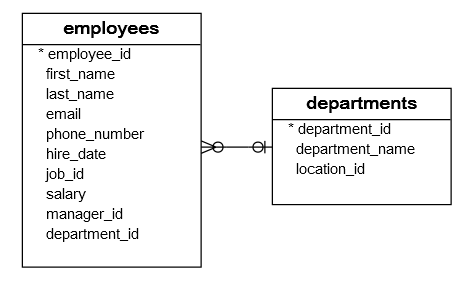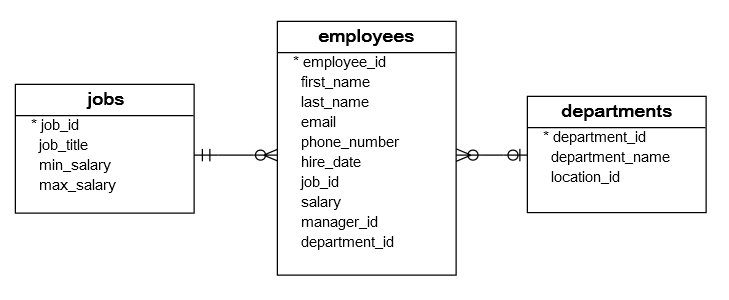Summary: in this tutorial, we will show you how to use the SQL INNER JOIN clause to query data from two or more tables.
Introduction to the SQL INNER JOIN clause
So far, you have learned how to use the SELECT statement to query data from a single table. However, the SELECT statement is not limited to query data from a single table. The SELECT statement can link multiple tables together.
The process of linking tables is called joining. SQL provides many kinds of joins such as inner join, left join, right join, full outer join, etc. This tutorial focuses on the inner join.
Suppose, you have two tables: A and B.
Table A has four rows: (1,2,3,4) and table B has four rows: (3,4,5,6)
When table A joins with table B using the inner join, you have the result set (3,4) that is the intersection of table A and table B.
See the following picture.

For each row in table A, the inner join clause finds the matching rows in table B. If a row is matched, it is included in the final result set.
Suppose the columns in the A and B tables are a and b. The following statement illustrates the inner join clause:
SELECT a
FROM A
INNER JOIN B ON b = a;Code language: SQL (Structured Query Language) (sql)The INNER JOIN clause appears after the FROM clause. The condition to match between table A and table B is specified after the ON keyword. This condition is called join condition i.e., B.n = A.n
The INNER JOIN clause can join three or more tables as long as they have relationships, typically foreign key relationships.
For example, the following statement illustrates how to join 3 tables: A, B, and C:
SELECT
A.n
FROM A
INNER JOIN B ON B.n = A.n
INNER JOIN C ON C.n = A.n;Code language: SQL (Structured Query Language) (sql)SQL INNER JOIN examples
Let’s take some practical examples of using the INNER JOIN clause.
1) Using SQL INNER JOIN to join two tables example
We will use the employees and departments tables from the sample database to demonstrate how the INNER JOIN clause works.

Each employee belongs to one and only one department while each department can have more than one employee. The relationship between the departments and employees is one-to-many.
The department_id column in the employees table is the foreign key column that links the employees to the departments table.
To get the information of the department id 1,2, and 3, you use the following statement.
SELECT
department_id,
department_name
FROM
departments
WHERE
department_id IN (1, 2, 3);Code language: SQL (Structured Query Language) (sql)
Notice that we used the IN operator in the WHERE clause to get rows with department_id 1, 2 and 3.
To get the information of employees who work in the department id 1, 2 and 3, you use the following query:
SELECT
first_name,
last_name,
department_id
FROM
employees
WHERE
department_id IN (1, 2, 3)
ORDER BY
department_id;Code language: SQL (Structured Query Language) (sql)
To combine data from these two tables, you use an inner join clause as the following query:
SELECT
first_name,
last_name,
employees.department_id,
departments.department_id,
department_name
FROM
employees
INNER JOIN
departments ON departments.department_id = employees.department_id
WHERE
employees.department_id IN (1 , 2, 3);Code language: SQL (Structured Query Language) (sql)
For each row in the employees table, the statement checks if the value of the department_id column equals the value of the department_id column in the departments table. If the condition
If the condition employees.department_id = departments.department_id is satisfied, the combined row that includes data from rows in both employees and departments tables are included in the result set.
Notice that both employees and departments tables have the same column name department_id, therefore we had to qualify the department_id column using the syntax table_name.column_name.
SQL INNER JOIN 3 tables example
Each employee holds one job while a job may be held by many employees. The relationship between the jobs table and the employees table is one-to-many.
The following database diagram illustrates the relationships between employees, departments and jobs tables:

The following query uses the inner join clauses to join 3 tables: employees, departments, and jobs to get the first name, last name, job title, and department name of employees who work in department id 1, 2, and 3.
SELECT
first_name,
last_name,
job_title,
department_name
FROM
employees e
INNER JOIN departments d ON d.department_id = e.department_id
INNER JOIN jobs j ON j.job_id = e.job_id
WHERE
e.department_id IN (1, 2, 3);Code language: SQL (Structured Query Language) (sql)
Now you should understand how the SQL INNER JOIN clause works and know how to apply it to query data from multiple tables.